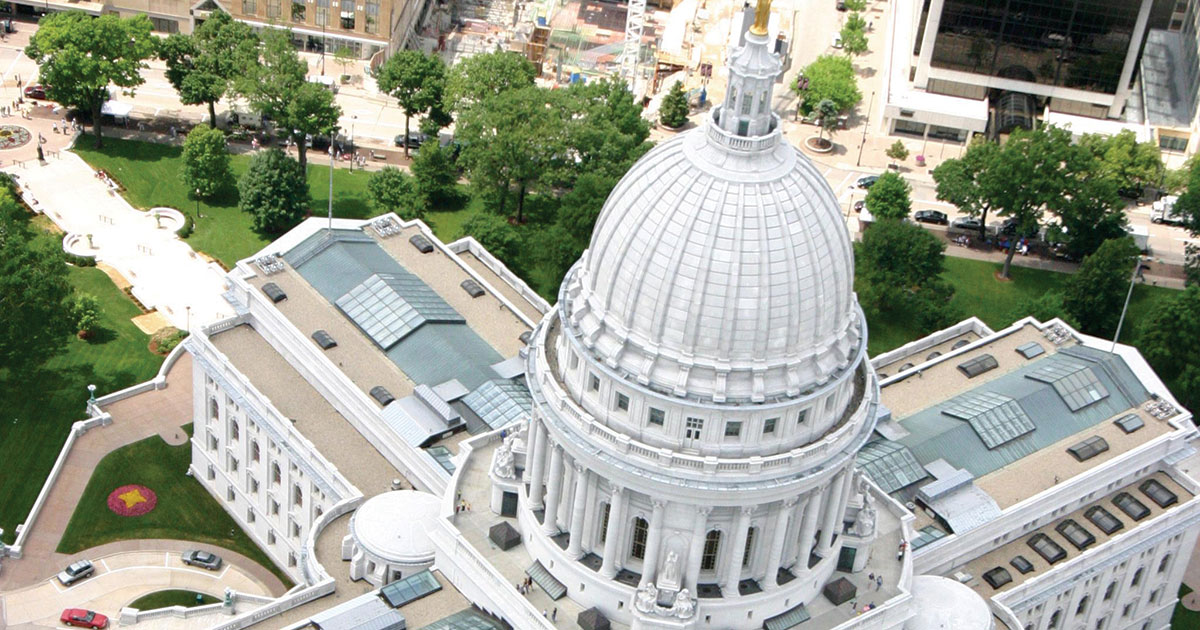
The State Bar of Wisconsin is one of the more active professional groups that engages in the legislative process in Madison. It also has some unique policies and procedures that must be followed to carry out both the mission of the State Bar and the objectives of the 15 practice sections that have elected to participate in the lobbying program.
Framework of State Bar’s Advocacy Program
There are many layers of Supreme Court rules, State Bar bylaws, section bylaws, state ethics laws, and even case law that govern the State Bar’s advocacy program and ensure the greatest transparency for the State Bar’s voice at the Capitol. These additional layers can sometimes pose a challenge to respond to fast-tracked legislative initiatives (especially during the end-of-session rush), but they also keep us focused on policies that affect the laws attorneys deal with every day.
 Cale Battles, is a government relations coordinator with the State Bar of Wisconsin. He can be reached by email, or by phone at (608) 250-6077.
Cale Battles, is a government relations coordinator with the State Bar of Wisconsin. He can be reached by email, or by phone at (608) 250-6077.
 Lynne Davis, is a government relations coordinator with the State Bar of Wisconsin. She can be reached by email, or by phone at (608) 250-6045.
Lynne Davis, is a government relations coordinator with the State Bar of Wisconsin. She can be reached by email, or by phone at (608) 250-6045.
 Devin Martin is grassroots outreach coordinator with the State Bar of Wisconsin.
Devin Martin is grassroots outreach coordinator with the State Bar of Wisconsin.
The State Bar’s advocacy department includes two full-time, in-house lobbyists who monitor, track, and review hundreds of legislative proposals each session. State Bar sections are frequently on the front end of legislative efforts, using their own volunteers to set up review committees that proactively draft legislation for consideration. These efforts are often the result of several years of review, drafting, and other volunteer tasks on issues that specifically affect their section’s practice area.
These proactive efforts are immensely rewarding legislative projects to work on. They provide the opportunity to engage stakeholders, trade associations, legislators, agency staff, and more to do as much front-end review and vetting as possible. When proposals are finally introduced as bills, they typically receive little to no opposition and garner unanimous bipartisan support. The projects originate from almost every section of the State Bar: updates to the trust code, expansion of guardianship options for minors, revisions to limited liability corporations, standardizing the de novo process in family court across the state, clarifying the annual reporting of financial information regarding child support and maintenance, remote notarization and witnessing, and many more.
Legislative Advocacy Successes and Challenges
Over the last decade, the State Bar has enjoyed great success in these efforts, opening doors to additional advocacy and outreach opportunities with legislators and policymakers. We now receive many more legislative and agency requests for feedback or opinions before legislation gets introduced, allowing State Bar members the opportunity to engage earlier to correct drafting errors or address a bill’s potential unintended consequences. Sometimes even more important, we can remove an issue from consideration completely before it is introduced by outlining a negative effect the drafter might not have realized could occur.
The intangible results of engaging before damaging issues gain speed in the legislature can be difficult to quantify. It is easy to measure the success of an effort to get legislation passed. We can point to an act number or maybe even hold a ceremonial bill-signing pen given out by the governor. It is much harder to recognize the efforts involved in preventing a potentially damaging piece of policy from making its way through the legislative process and onto the governor’s desk.
Not all the State Bar’s lobbying work is proactive collaboration and compromise, however. The State Bar sometimes must take reactive positions of opposition to introduced bills. One of the most difficult parts of lobbying is breaking the news to a legislator and the legislator’s staff that the State Bar or a section opposes their legislative proposal. Frequently, legislative authors and stakeholders will appreciate concerns and collaborate on solutions and compromise. There are other times when we must “agree to disagree” and hope to continue with an open dialogue. With this give and take, we don’t win every policy argument, but the end product is often much better than where it started.
However, there are circumstances when a much more competitive process ensues. Compromises can fail for any number of reasons, or the priorities of another stakeholder are so high that an offer of collaboration is not available. These disagreements can get messy, and there are even situations in which it takes a little time to rebuild relationships with legislators and their staff. Through it all, the advocacy team works hard to ensure lawmakers know we are always available to help them produce good public policy above all else.
Why Legislative Advocacy Is Vital
What is most important is having lawmakers understand the vital role the State Bar plays in legislative initiatives and why its voice matters. When a position of support or opposition is taken, it is done so under the review of either the State Bar’s elected Board of Governors or by a practice section’s board members with expertise in the matter. All positions require a minimum of a 60% majority vote to act. In addition, those sections must also produce a position rationale indicating the effects on a specific practice, legal clients, or Wisconsin residents. These positions are not taken without extensive thought and consideration.
The State Bar and its lobbying sections’ positions are as expansive as the practice of law itself. During the 2023-24 legislative session, which has yet to officially conclude, the State Bar has engaged on nearly 60 legislative proposals. This doesn’t include the biennial budget bill, which includes many topics the State Bar advocated on. This summer, the Wisconsin Lawyer will publish a comprehensive review of legislation of interest to members, including several bills that will be signed into law in early spring.
The State Bar’s extensive advocacy work is increasingly important as the number of lawyers who serve in the legislature shrinks. As laws are written, understanding how they are interpreted by courts or may affect parties in litigation is an invaluable asset to legislators. Without as many attorneys in the legislature, the voice of the State Bar’s members and lobbyists fill this role. Currently, of the 132 elected legislators, there are only 10 lawyer-legislators. Over the past few decades, the number of lawyer-legislators has continued to decline, and following the 2024 election it is possible the number will be into the single digits.
To ensure that the profession’s needs are not underrepresented at the Capitol, even with dwindling numbers of lawyer-legislators, the State Bar has engaged in a robust grassroots advocacy program, working to connect the voices of individual State Bar members with their lawmakers. Over the past few years, we have visited several places in the state including La Crosse, Eau Claire, Appleton, Kenosha, and Janesville, to assist in creating opportunities to connect members with their elected officials. Our department will be on the road this spring, summer, and fall and we are open to coming to a meeting of your local bar association, the county courthouse, a coffee house, or a law firm to help open those doors. We hope you will join us at an event and maybe even hear behind-the-scenes stories about some fun and not-so-fun political battles.
The State Bar’s lobbying program is only as strong as members’ participation. Staff lobbyists use our expertise on the process and our relationships with lawmakers and staff to assist with message development and navigating ever-changing political dynamics. State Bar members are the policy and legal experts and by far the best advocates for explaining the pros and cons of the real-world effects a proposed legislative effort would have on their profession and the clients they serve.
» Cite this article: 97 Wis. Law. 47-48 (April 2024).
